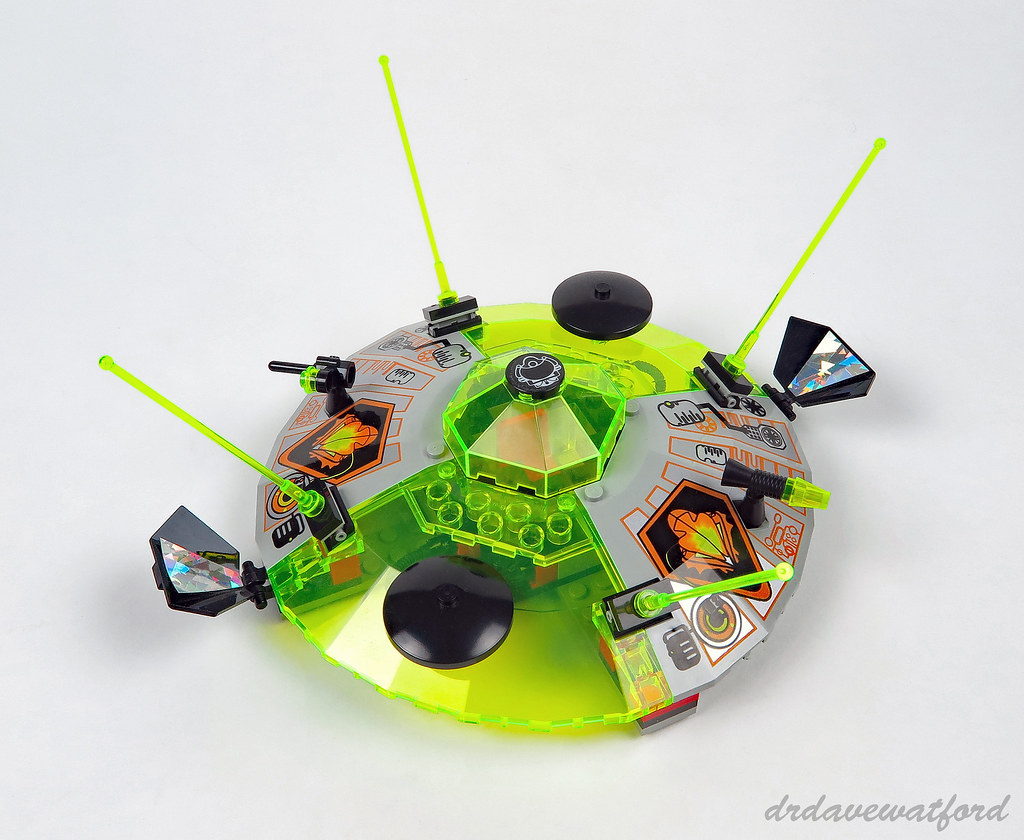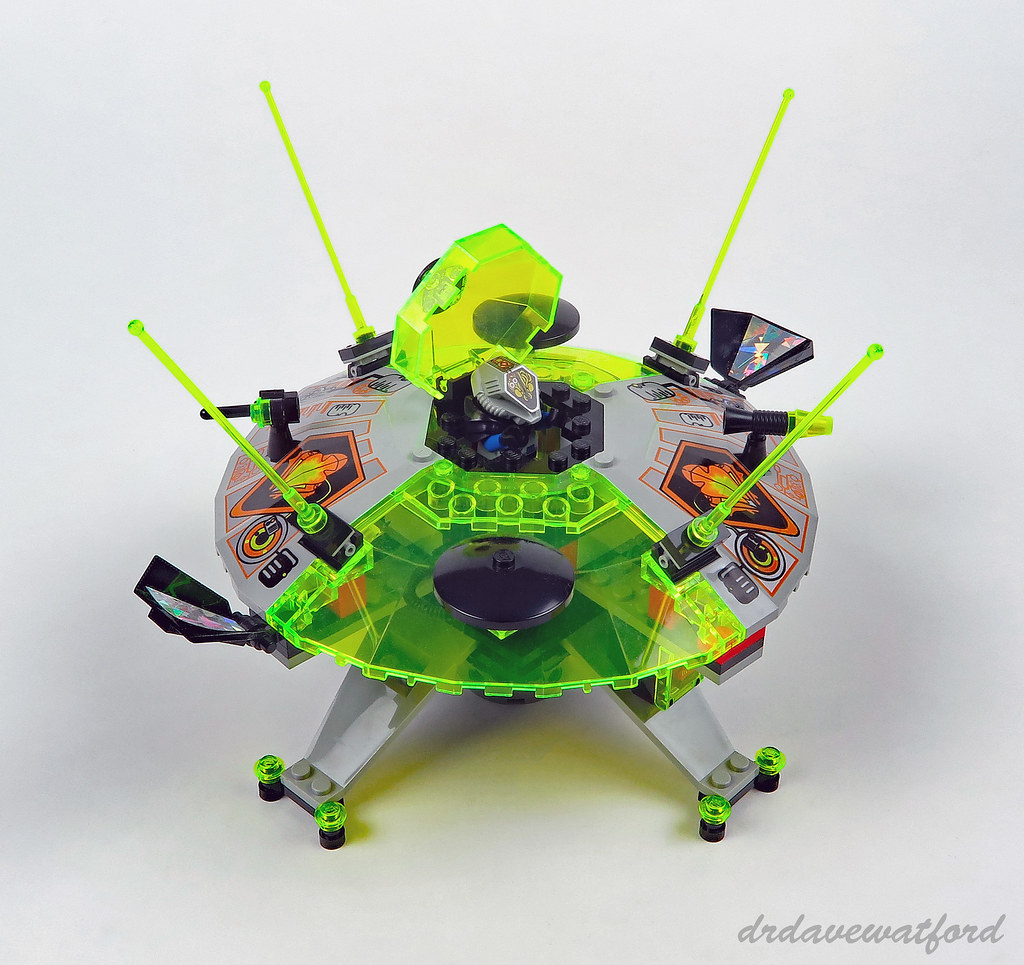OK, so I don't need anyone to remind me that I haven't exactly been prolific over the past few years when it comes to posting on Gimme LEGO.... That having been said, what I have posted provides a big clue to the identity of possibly my greatest passion when it comes to LEGO, namely space sets. A quick skim of the index of previous posts reveals that even if you exclude Star Wars I've served up significantly more reviews of space sets than of any other theme; vintage space sets such as 924 Space Cruiser, 6896 Celestial Forager and 6897 Rebel Hunter have been particularly well represented. A recent trawl through some of those old reviews whetted my appetite for more, so I thought I'd dig out an old space set from a subtheme that I'd not previously covered on Gimme LEGO and share it with you.
6900 Cyber Saucer was released in 1997 as part of the UFO subtheme of LEGO Space. The front of the box (above) looks frankly psychedelic, showcasing the completed craft flying above a green quasi-organic planet surface which is almost as retina-searing as the trans-neon green accents of the ship itself. Blurred clouds of magenta space dust and stars provide a suitably vivid backdrop. The back of my bashed box (below) is dominated by images of a couple of dubious-looking alternate builds. There are also a couple of panels which illustrate play features of the set, namely a rotation function and what appears to be a temperature-sensitive print on one of the elements.
The front of the instruction booklet (below) features the same image as the front of the box, but with one interesting difference, specifically the inclusion of an alternative set number (6999) alongside the actual set number. I initially assumed that 6999 was the number of the set in the US or elsewhere, but it turns out that 6999 was in fact the set number of a limited edition bundle consisting of a copy of 6900 plus a hard plastic promotional mask. The instruction booklet comprises 15 pages, all of which are occupied by building instructions; there's no advertising, which is always a bit of a shame in older sets, while the back cover is pretty much identical to the back of the box and therefore not shown here.
The set contains a solitary minifigure, designated as UFO Zotaxian Alien - Blue Officer (Commander X) by Bricklink. This minifigure only appears in a single set, 6975 Alien Avenger, in addition to 6900 and 6999. The torso and legs, with their intricate prints, are exclusive to this minifigure. The black breastplate and shoulder protector is shared with a number of other minifigures across the UFO and Insectoids space subthemes, while the light grey printed helmet is shared with a UFO Zotaxian Red Pilot minifigure which appears in a number of other UFO sets.
Beneath the Predator-esque helmet is a printed trans-neon green minifigure head. As was the case for the printed torso and legs, the head print is exclusive to this particular minifigure. There's no back print on the head.
The breastplate and shoulder protector also provides substantial protection for the upper back. In marked contrast to the extensive and complex printing on the front of the minifigure there's no printing at all on the back of the helmet, torso or legs.
Moving on to the saucer, the shape is largely defined by four 10 x 10 x 2 1/3 quarter saucer top panels. Two of these panels are trans-neon green in colour and have appeared in just 4 sets including this one and 6999, while the other two are printed old grey left and right variants which have each appeared in a total of 5 sets. The orange, black and silver prints on the latter two elements are great, featuring a stylised representation of the alien minifigure helmet from above together with some additional detailing. The quarter panels surround a simple brick-built cockpit containing a solitary red seat. A couple of decorative black 8.5L flexible hoses attach to the sides of the cockpit beneath the panels, while a pair of 3 x 5 deltoid panels attach to the outside edge of the saucer on opposite sides. Given the shiny silver stickers which are attached to them I suspect that they're supposed to be solar arrays. In addition to the deltoid panels, the exterior of the saucer is embellished with numerous other attachments including trans-neon green 8H whip antennae, black 4 x 4 inverted dishes, a minifigure loudhailer tipped with a trans-neon green 1 x 1 cone, and a minifigure space scanner tool. All of the attachments can be either rotated or tilted on small hinges, thus boosting the play value.
The cockpit is enclosed by a trans-neon green 6 x 6 octagonal canopy which is hinged at the rear to provide easy cockpit access. A black 2 x 2 round tile sits on top of the canopy. This tile is decorated with a heat-sensitive sticker, which is something that I've never encountered in a LEGO set before. When the sticker is cold the central area is blank, but when the sticker is pressed and warmed with a fingertip a dark green pattern appears in the central area. This 'play feature' is demonstrated in the instruction booklet (below). The sticker in my copy of the set shows a faint olive green pattern even when untouched, however, similar to what you can see here; I'm not sure whether that's because the ambient temperature is currently quite high in my LEGO room, or just because the sticker is now at least 23 years old and therefore not operating quite as efficiently as it was when it was new.
The saucer sits on top of a simple landing stage. This is supported at its periphery by four light grey bi-level wings and centrally by a pillar which incorporates four black 2 x 2 x 2 stands. The bi-level wings are quite rare in light grey, having appeared in just four sets in this colour including 6900 and 6999. There's a black 2 x 2 x 2 container mounted on one of the peripheral supports. The open face of the container is enclosed by a trans-neon green door which opens to reveal a printed tile that's presumably supposed to represent tech of some sort. The landing stage is topped by a red 4 x 4 turntable with square base.
The neon-green and light grey elements incorporated into the landing stage provide some welcome consistency with the saucer's colour scheme. The saucer fits neatly on top of the landing stage, and since the only point of attachment is the 4 x 4 turntable it can consequently rotate freely through 360 degrees.
I have to admit that I was initially quite sceptical about this set, and was ready to pretty much write off the UFO subtheme as a poor relation of the much-loved Classic Space sets of the late 1970s and early to mid 1980s. The colour scheme is less appealing to me than the palette of the older space sets, and the preponderance of large, prefabricated elements such as the 10 x 10 quarter panels and the landing stage supports made the build all too brief and had me wishing that I had chosen to assemble a set which didn't rely so heavily on such short-cuts. Now that I've built it, however, I'm feeling a little more charitable - I like the minifigure, the saucer is more swooshable than I expected, and the build is crammed with play features - literally everything attached to the upper surface of the saucer can be tilted or rotated and the saucer spins freely on its landing stage. Furthermore, the design does a decent enough job of aping the cliched flying saucer stereotype, and I'm mindful that there are probably legions of twenty-somethings out there who look back misty-eyed at the UFO sets of their youth the same way as older AFOLs revere the Classic Space sets.
Set 6900 Cyber Saucer contains 114 parts and was released back in 1997. There's clearly love for the set out there as at time of writing the cheapest complete boxed example of the set is listed at almost £50 plus shipping on Bricklink. Complete unboxed examples start at about half that, however, and you might also be able to find one cheaper on eBay.











